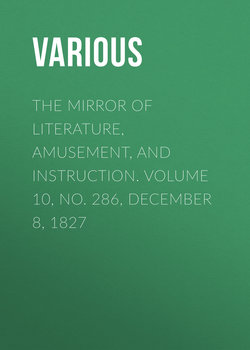Читать книгу The Mirror of Literature, Amusement, and Instruction. Volume 10, No. 286, December 8, 1827 - Various - Страница 5
TEA.—ITS INTRODUCTION INTO ENGLAND
THE DEATH OF KING JOHN
ОглавлениеExtracted from an old black-letter volume, entitled "The Abridgment of the Acts and Monuments of Martyrs, from the earliest period of Christian suffering to the time of Queen Elizabeth, our gracious lady, now reigning," printed in her reign
(For the Mirror.)
In the yeere 1216, king John was poisoned, as most writers testify, at Swinsted Abbey, by a monk of that abbey, of the order of Cistersians, or S. Bernard's brethren, called Simon of Swinsted. The monk did first consult with his abbot, shewing him what he minded to do, alleging for himself the prophecy of Caiphas, 11th of John, saying, it is better that one man die, than the whole people perish. I am well content, saith he, to lose my life, and so become a martyr, that I may utterly destroy this tyrant. With that the abbot did weep for gladness, and much commended his fervent zeal. The monk then being absolved of his abbot for doing this fact, went secretly into the garden, on the back side, and finding there a most venomous toad, did so prick him and press him with his penknife, that hee made him vomite all the poison that was within him; this done, he conveyed it into a cup of wine, and with a flattering and smiling countenance he sayeth to the king, "If it shall please your princely majesty, here is such a cup of wine as you never drank better in your lifetime. I trust this wassall shall make all England glad," and with that he drank a great draught thereof, and the king pledged him; the monk then went out of the house to the back, and then died, his bowels gushing out of his belly, and had continually from henceforth three monks to sing mass for him, confirmed by their general charter. The king, within a short space after, feeling great grief in his body, asked for Simon, the monk; answer was made he was dead. "Then God have mercy on me," said the king; so went he to Newark-upon-Trent, and there died, and was buried in the cathedral church at Worster, in 1216, the 19th day of October, after having been much fered with the clergy 18 years, 6 months, and a day.
MALVINA.
